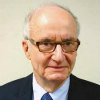Book Review: Then They Came for Me: Martin Niemöller, the Pastor Who Defied the Nazis

German Lutheran Pastor Martin Niemöller is best known for his celebrated confession:
First, they came for the Communists, and I did not speak out—
Because I was not a Communist.
Then they came for the Socialists, and I did not speak out—
Because I was not a Socialist.
Then they came for the Trade Unionists, and I did not speak out—
Because I was not a Trade Unionist.
Then they came for the Jews, and I did not speak out—
Because I was not a Jew.
Then they came for me—and there was no one left to speak for me.
These oft-quoted words at Holocaust commemorative observances might lead you to believe that Niemöller was sympathetic to Jewish suffering during the Holocaust. Not true.
Matthew D. Hockenos, professor of History at Skidmore College and author of Then They Came for Me (Basic Books, 2018), writes that Niemöller (1892-1984) was not incarcerated in concentration camps because he opposed the mass murder of Jews or other atrocities, but for insisting on the political autonomy of German Protestant churches in Nazi Germany.
One of the pastor’s alleged “crimes” was “the misuse of the pulpit for political [anti-Nazi] purposes.” Before his arrest by the Gestapo, Niemöller publicly opposed the Nazi- inspired “Deutsche Christen (DC)” or “German Christian” movement, which critics derisively called the Brown Church because many of its leaders dressed in brown Storm Troopers’ uniforms. Its bishops wore swastikas on their ecclesiastical robes and offered the infamous stiff-armed Nazi salute.
The anti-Semitic Brown Church demanded the elimination of all “Jewish influences” from teaching, liturgy, and preaching. Above all, the Deutsche Christen Church believed in an “Aryan,” non-Jewish Jesus.
In the 1930s, Niemöller was a pastor in Dahlem, a fashionable area of Berlin. He opposed the DC movement because it was contrary to a fundamental Christian belief that the Church must be free of political control. Hockenos writes: “[The schism] in German Protestantism was primarily over church autonomy – not Nazi politics or racial [anti-Semitic] policy.”
Niemöller continued to preach that Jews were a despised people, “Christ killers.” He also asserted that Hitler, the temporal ruler, was “an instrument approved by God.”
Niemöller’s nationalistic passions preceded the emergence of the Third Reich. An enthusiastic supporter of Kaiser Wilhelm II, Germany’s “Supreme War Lord,” he proudly sunk enemy ships as a submarine commander during World War I, and at war’s end, he refused to surrender his U-Boat to the victorious Allies.
After completing his theological studies in the early 1920s, Niemöller inextricably linked his fervent Protestantism to extreme German nationalism. So it was easy, in 1933, to shift his earlier adoration of the Kaiser to Hitler. Indeed, Niemöller voted for the future führer three times in several elections before Hitler became Germany’s dictator. As an expression of his enthusiasm for the war effort, in 1939, while still a concentration camp prisoner, Niemöller volunteered to serve in Hitler’s Navy. His request was refused.
Immediately following World War II, many American Protestant leaders sought to rebuild positive ecclesiastical relations with Germany and were quick to declare Niemöller a “good German,” even a Christian martyr, as evidenced by his eight-year (1937-45) incarceration, often in solitary confinement, in Sachsenhausen and Dachau.
After Germany’s defeat in 1945, Niemöller made a series of controversial, public, anti-Semitic statements, while at the same time expressing his Church’s collective guilt for the Holocaust. He condemned “denazification” efforts, terming them vindictive, and he falsely charged that German Jewish emigrants to the United States were the leaders of a harsh punitive American policy toward vanquished Germany.
Niemöller and his wife were the first German civilians to receive visas to the United States, for a lecture series, mainly before Protestant audiences. First Lady Eleanor Roosevelt and Rabbi Stephen S. Wise, the most prominent Jewish leader of that era, strongly opposed the Niemöllers’ visit.
Wise was furious:
“[Niemöller] suffered no more than other victims and far less than…Jewish residents of concentration camps, who, unlike Niemöller, never emerged alive…”
The German pastor’s travel to the United States was but the first of an extraordinary number of visits to many other countries, where he was celebrated as a religious and political hero. In the decades following World War II, his public image became that of a universal pacifist in the tradition of Mohandas Gandhi.
In his later years, Niemöller became a sharp critic of “American imperialism,” and he made trips to the Soviet Union, where he received the Lenin Peace Prize. He also had a personal meeting with Ho Chi Minh in Hanoi during the Vietnam War.
“Niemöller was on the wrong side of history for much of his life, concludes Hockenos. “He did not emerge from Dachau a completely changed man…His evolution was gradual, halting and in many respects incomplete. But change he did…while his willingness to change [including an abandonment of anti-Semitic beliefs] is laudable, Niemöller is far too complex a character for hero worship.”
Rabbi A. James Rudin is the former head of the American Jewish Committee’s Department of Interreligious Affairs and author of seven books, including Pillar of Fire: A Biography of Stephen S. Wise.


